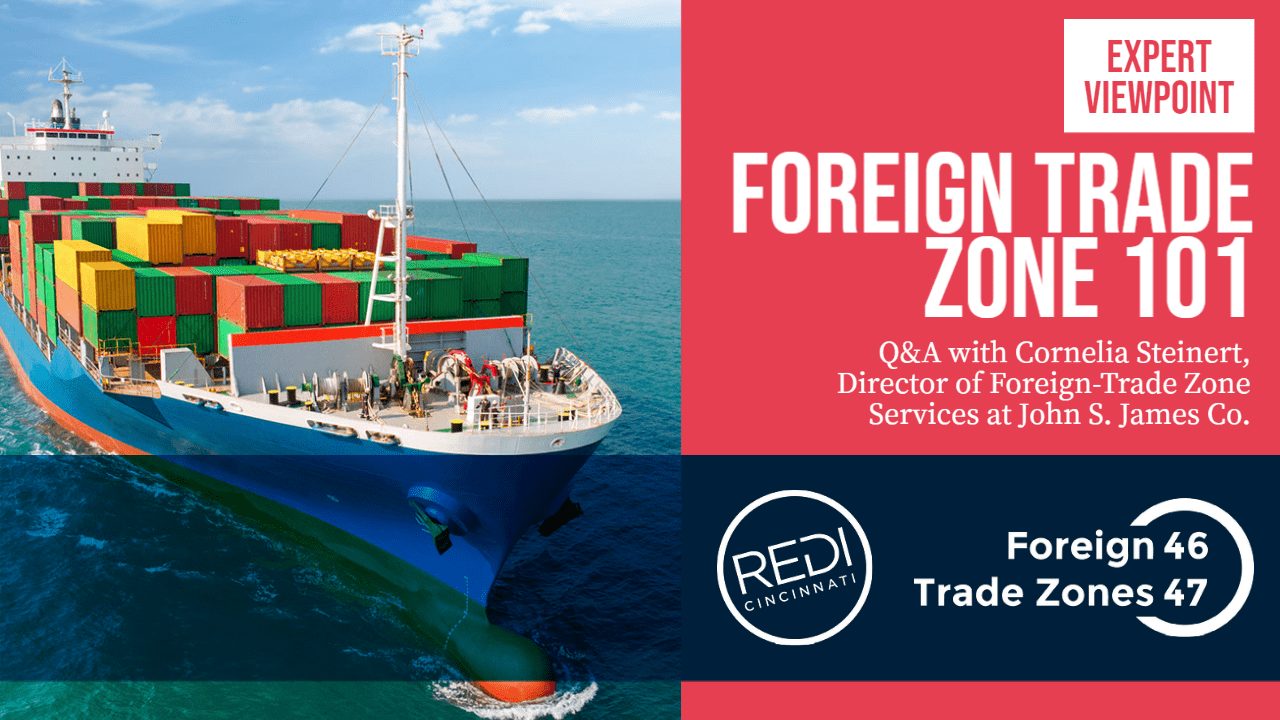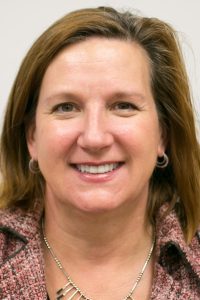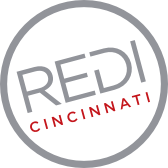A simplified examination of FTZ’s with expert Cornelia Steinert

September 6, 2022
Considering a Foreign Trade Zone (FTZ), but don’t have much understanding of them or know where to begin? REDI Cincinnati spoke with Cornelia Steinert, director of foreign trade zone services at the John S. James Co., to provide an overview of FTZs through an informative Q&A. Cornelia has more than 35 years’ experience working with foreign trade zones, and she shares some of her knowledge below, including key terminology, the role of customs, timing and more.

Cornelia Steinert, Director of Foreign Trade Zone Services, John S. James Co. (Provided)
FTZ Q&A with Cornelia Steinert
Q: Can you provide a 30-second elevator pitch of FTZ’s?
A: If your company is importing and exporting or importing and manufacturing, a Foreign Trade Zone can help your company with savings on duties, re-exports, scrap and documentation. An FTZ is an area considered to be outside of the Commerce of the United States but is under the authority of the FTZ Board and under the oversight of local U.S. Customs.
Q: When considering an FTZ, what are some of the key terminology people should be familiar with?
A:
- Grantee: The local entity, which manages the zone on the local level, holds the grant from the Department of Commerce. Within the Cincinnati region, this is the Greater Cincinnati Foreign Trade Zone, which operates Zones 46 and 47 in Greater Cincinnati and Northern Kentucky, respectively.
- Operator: The entity holding the FTZ Customs Bond that has approval from Customs and the Grantee to receive and manage foreign trade zone material. This may be the company, a warehouse, a consultant or other entity that receives and manages FTZ materials on behalf of the company.
- User: The actual importer whose products are being brought into the FTZ (can be the same as the operator).
- Zone Site Administrator: The person or persons responsible for overseeing compliance with the FTZ. Typically, this is an employee of the company or a consultant contracted by the company.
- Zone Site: The physical property, which is the defined area by the Department of Commerce for the FTZ.
- ASF (Alternative Site Framework): The organizational structure governing the Grantee.
- ASF Site Application: The application filed with the FTZ Board in cooperation with the Grantee.
- Production Notification Authority Application: The application which is filed with the FTZ Board
- This involves meeting with U.S. Customs and includes a request for the formal activation of the site. A security review and background checks of key employees are part of the application process.
- FTZ Board: Part of the Department of Commerce, the Federal FTZ Board is in direct communication with the Grantee for the oversight of the local grant.
Q: What are some of the key roles within an FTZ?
A:
- Grantee Contact: The individual employed by the local entity holding the Department of Commerce’s grant who serves as the primary contact for the Operator and User.
- Grantee Board of Directors – The local board of directors that oversees the local entity. The Greater Cincinnati Foreign Trade Zone Board of Directors consists of 12 members with backgrounds in law, trade compliance, economic development, academia, finance, and real estate. The Grantee Contact reports to the Grantee board of directors.
- Zone Site Administrator: Person who is responsible for the Operator’s Customs compliance, and who will be responsible for the day-to-day FTZ operations (filing Customs documents)
- Customs Contact: A local Customs officer who oversees FTZ compliance.
Q: Will you provide a high-level summary of the process to become a designated site?
A: Contact the Grantee to identify if a property falls within the published Service area. Discuss the application process with the Grantee and whether an ASF application or a Subzone Application needs to be filed.
Once the site is designated (after the application is approved by the FTZ Boards), it will need to be activated with U.S. Customs.
Q: What is the formal role of U.S. Customs?
A: U.S. Customs has general oversight of an FTZ project. A formal “Activation” request needs to be filed (and approved) with Customs. This will involve a site visit by Customs, a security review and a formal procedures manual being filed with Customs.
On an annual basis, Customs will perform an on-site Compliance Review.
Q: What is the role of service providers and consultants:
A: A consultant can provide valuable assistance with preparing the FTZ Board filings, as well as managing the activation process.
Service providers will be able to provide Customs filings of FTZ entries and Admissions, as well as full spectrum FTZ administration, and additional consulting as needed.
Q: What are some tips and best practices for optimizing the FTZ process?
A:
- Invite U.S. Customs into the process early so it can see the site, meet the key individuals of the project and receive a project overview. This also provides an opportunity to share a draft copy of the application when appropriate.
- Create an organized plan for filing Customs documents, and maintaining inventory control in order to provide an audit trail from admission to removal
Q: What is an approximate timeline for approval to be granted an operator/user of an FTZ?
A: Generally, it takes 90 days to prepare, file and receive FTZ Board approval. It takes approximately 120 days to prepare Activation documents, receive Background Check approvals, and activation approval. However, there can be some overlap of these times to shorten the process.
Q: If a company or individual is looking for more support with FTZs, where should they look (organizations, websites, etc.)?
A:
- The FTZ Board
- The National Association of Foreign Trade Zones
- The local Grantee (Greater Cincinnati Foreign Trade Zone for Zones 46 and 47)
- A company’s Customshouse Broker
- International Trade Consultants
About Cornelia Steinert
Cornelia Steinert is a seasoned international trade professional with over thirty-five years of experience. As the Director of Foreign Trade Zone Services for John S. James Co., she coordinates and oversees all aspects of operations, compliance and Foreign Trade Zone development.
Cornelia previously served as the Senior Manager of International Trade for Canon Virginia Inc., where she oversaw the compliance, and operations of Canon Virginia’s import, export, and manufacturing foreign trade zone programs, which included participation in Customs Machinery Center for Excellence and Expertise (CEE),CT-PAT and the Customs Importer Self-Assessment Program (ISA).
Cornelia is a long-term member of the National Association of Foreign Trade Zones serving on the Membership, Automation, and Operator/User Committees, as well as numerous taskforces. She has spent several years as a board member, and as a member of the executive committee.
Cornelia is a graduate of Old Dominion University. She is a licensed Customshouse Broker, a Certified Customs Specialist and an Accredited Zone Specialist. She is the past recipient of both the Virginia International Trade Ports Innovator of the Year Award, and the Virginia International Business Council Global Excellence Award.
About John S. James Co.
The John S. James Co. was founded in 1941 in the city of Savannah, GA. Our mission of offering personalized service to the international transportation community quickly established our firm as a leader in the international freight forwarding and customs brokerage industries. Our founder’s initial vision, providing unparalleled service to our customers, still resonates in our culture today. Our reputation for excellence is a direct result of our commitment to service and professionalism.
In the years since our founding, our operations have expanded into six (6) major southeastern cities which include Atlanta GA, Charleston SC, Charlotte NC, Jacksonville FL, Knoxville TN, and Savannah GA. Physical locations, however, do not limit our ability to provide global service to our clients. We maintain corresponding partnership agreements with a multitude of companies in the United States and around the globe, enabling us to handle shipments to and from all international ports. Our memberships in GLOBAL LOGISTICS ASSOCIATES (GLA) and GLOBAL AFFINITY ALLIANCE (GAA) afford us access to a network of professional partners all over the world.
Our organization employs over 150 International Customs and Forwarding Specialists, serving the needs of the transportation community. The John S. James Co. provides unmatched expertise in the handling of customs document preparation and cargo coordination in the International Marketplace. Our services include, but are not limited to the following: Customs Brokerage, Freight Forwarding, Transportation & Logistics, NVOCC, Warehousing & Distribution, Chartering & Project Services, Foreign Trade Zone Services and Consulting Services.
Greater Cincinnati Foreign Trade Zone, Inc. (GCFTZ)
Greater Cincinnati Foreign Trade Zone, Inc. was established in 1979 as Grantee of FTZ 46 and 47. The nonprofit organization operates under the direction of a 10-member board of directors, whose members represent regional international business and economic development leadership. Grantee responsibilities include implementing zone schedules, assisting current and prospective users in zone activation, reporting to federal agencies, and marketing the FTZ to companies that would benefit from the zone. In 2014, GCFTZ contracted with The Port to provide management, marketing, and governance services for FTZ 46 and 47.
